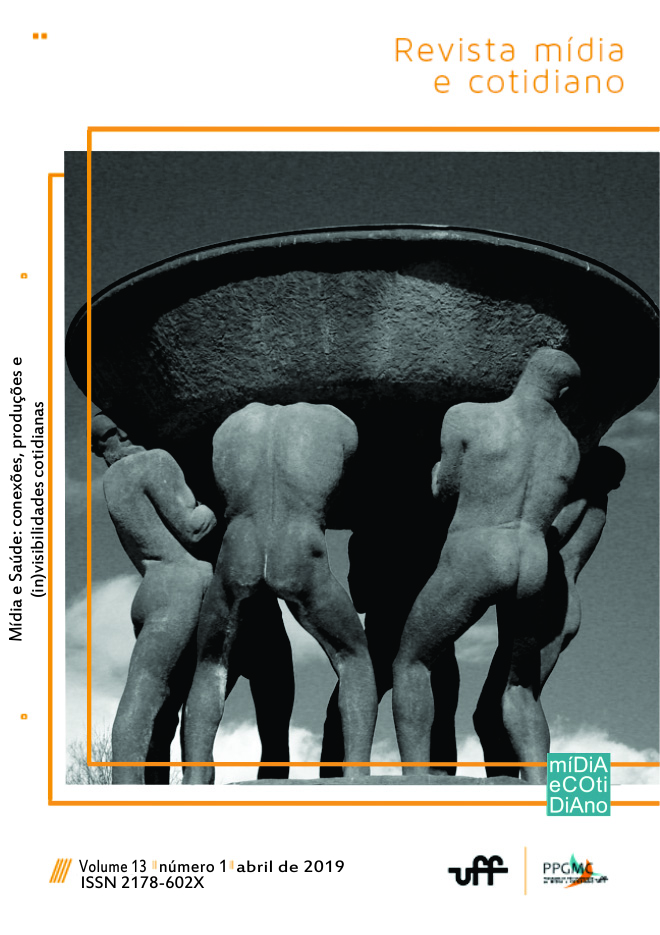The practice of online re-information
DOI :
https://doi.org/10.22409/ppgmc.v13i1.27143Résumé
The purpose of this article is to study the practice of online re-information. The case studied is the sphere of re-information on the French web, namely hundreds of sites and blogs in connection with the ideas of the French far right practicing re-information., where new information is proposed on political, religious, social or cultural news. While the use of the prefix re- in "re-inform" indicates the idea of renewal and a critical revision, it is used by re-information sites to mark rather a counter-information, a denial or a rejection of any other information. After having defined the practice of re-information, the hypotheses and the methodology, our study focuses on the discursive and communicational orientations in the re-information sphere before bringing elements of interpretation by relying on the question of the false information and on studieson the sociology of beliefs.Téléchargements
Références
Amiot, Dany (2002), "Re-, aspectual prefix", Cahiers Chronos No. 10, Amsterdam: Rodopi, pp. 1-20.
Badouard, R. (2017), The disenchantment of the internet. Disinformation, rumor and propaganda, Editions FYP, coll. "Presence / Social Issues".
Blanc, Ch. (2015), "Catholic traditionalist networks and" reinformation "on the web: mobilizations against" Marriage for all "and" pro-life ", tic & society [Online], Vol. 9, No. 1-2 | 1st semester 2015 - 2nd semester 2015, posted on 11 January 2016, accessed on 27 November 2017. URL: http://ticetsociete.revues.org/1919
Bronner, G. (2013a), The democracy of the gullible, Paris: PUF.
Bronner, G. (2013b), Contemporary Beliefs and Imaginaries, Paris: Editions Manucius.
Bronner, G. and Gehin, Et. (2010), The disturbing precautionary principle, Paris: PUF.
Camus, J.-Y. (1996), The extreme right today, Toulouse: The essentials Milan.
Cardon, D. and Granjon, F. (2010), Mediactivists, Paris: Sciences Po the Presses.
Chomsky, N. and Herman E. (2008), The Making of Consent. Media propaganda in democracy. Paris: Agone publisher, coll. "Backfires".
Eliade, M. (1969), Myth of the eternal return. Archetypes and repetition, Paris: Gallimard.
Glevarec H., Macé E., Maigret E. (2008), Cultural Studies Anthology, Paris: Armand Colin
Jalenques, P. (2002), "Semantic study of the French contemporary prefix: about several current debates in derivational morphology", in French language Vol. 144 N ° 1 The lexicon, between identity and variation, pp. 74-90
Jalenques, P. (2000). Contribution to the study of the prefix RE in contemporary French: for a compositional analysis of the verb to look, University of Paris 7: doctoral thesis.
Jammet, Th. And Guidi, D. (2017), "Observer Observers. From media pluralism to anti-Islam populism, analysis of a Swiss "reinformation" site and its connections ", Networks 2017/2 (n ° 202-203), p. 241-271.
Lecoeur, E. (2007) (eds.), Dictionary of the extreme right, Paris, Larousse.
Maschrin, L. (2007), Morphosemantic analysis of aspectuo-temporality in French. The case of the prefix re-. University of Nancy II: PhD thesis.
Mercklé P. (2004a) Sociology of Social Networks, Paris: Discovery
Milza, P. (1987), French Fascism Past and Present, Paris: Champs Flammarion.
Picoche, J. (1992), Accuracy of French lexicology, Paris: Vigor Editions
Schmelck, C. (2017), "Fachosphere diving", Medium 2017/3 (N ° 52-53), p. 199-212.
Taguief, P.-A. (2012), The new national-populism, Paris: CNRS Éditions.
Winock, M. (1993) (ed.), History of the far right in France, Paris, Éditions du seuil.
Téléchargements
Publiée
Numéro
Rubrique
Licence
Aviso de Direito Autoral Creative Commons
1. Política para Periódicos de Acesso Livre
Autores que publicam nesta revista concordam com os seguintes termos:- Autores mantém os direitos autorais e concedem à revista o direito de primeira publicação, com o trabalho simultaneamente licenciado sob a Licença Creative Commons Attribution que permite o compartilhamento do trabalho com reconhecimento da autoria e publicação inicial nesta revista.
- Autores têm autorização para assumir contratos adicionais separadamente, para distribuição não-exclusiva da versão do trabalho publicada nesta revista (ex.: publicar em repositório institucional ou como capítulo de livro), com reconhecimento de autoria e publicação inicial nesta revista.
- Autores têm permissão e são estimulados a publicar e distribuir seu trabalho online (ex.: em repositórios institucionais ou na sua página pessoal) a qualquer ponto antes ou durante o processo editorial, já que isso pode gerar alterações produtivas, bem como aumentar o impacto e a citação do trabalho publicado (Veja O Efeito do Acesso Livre).


